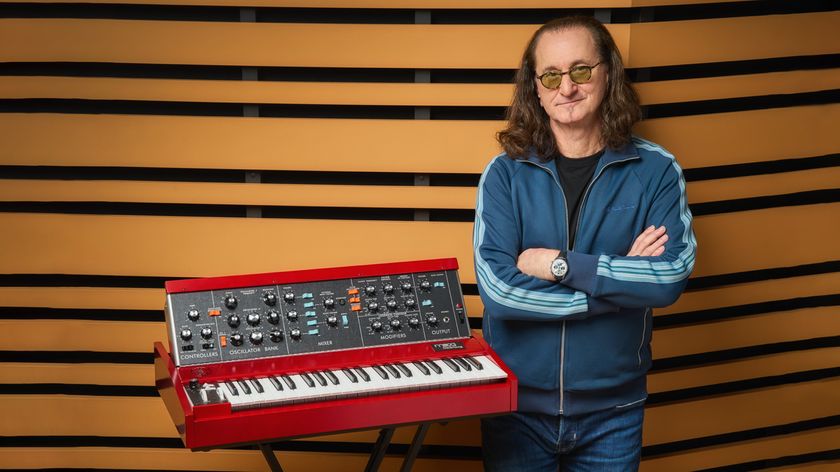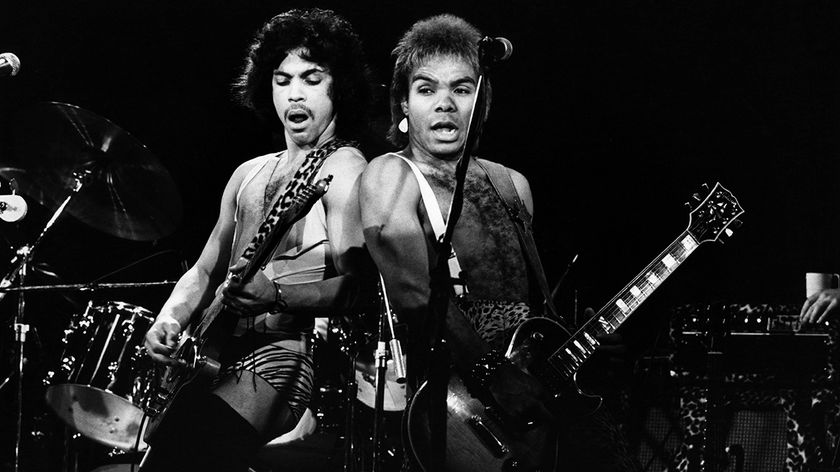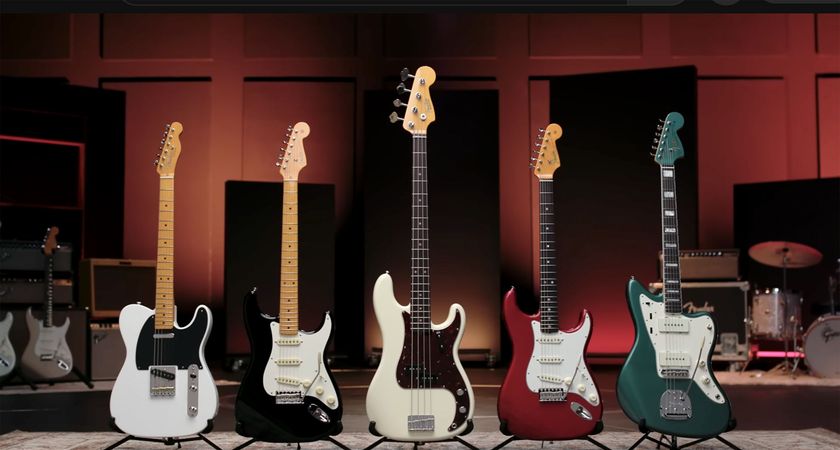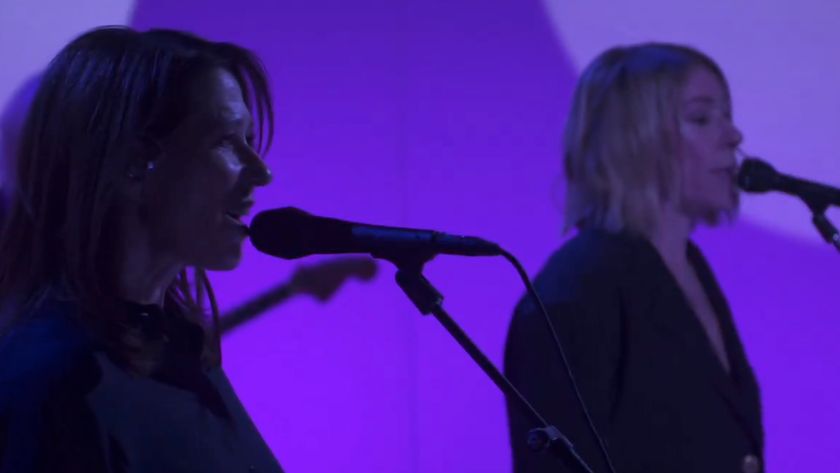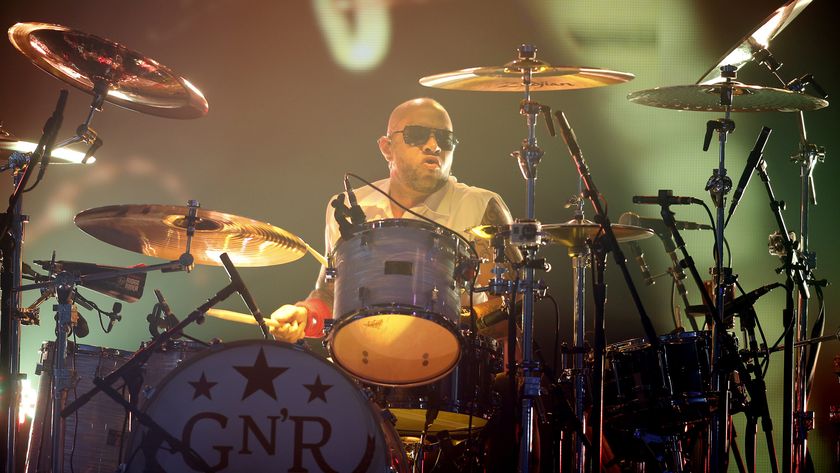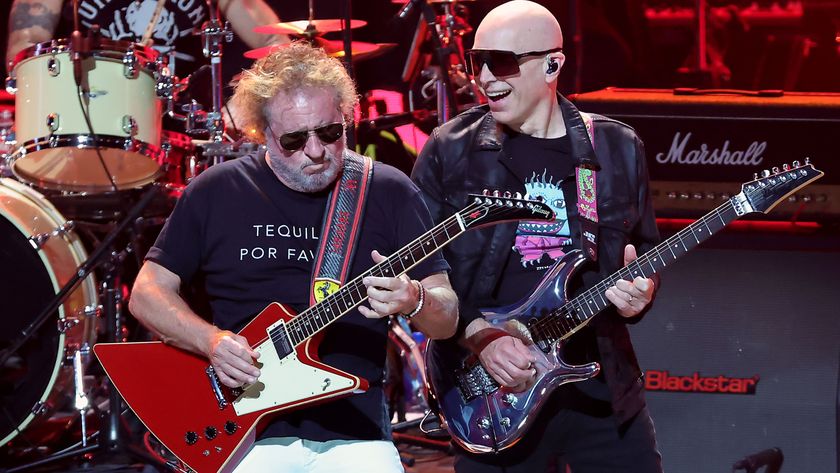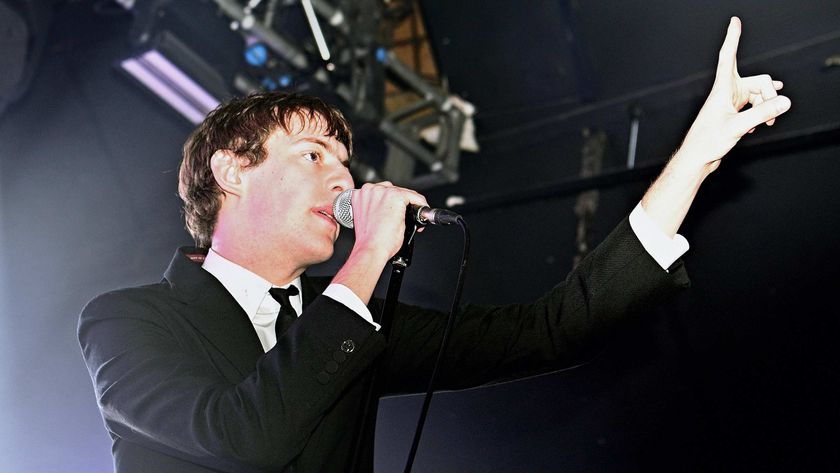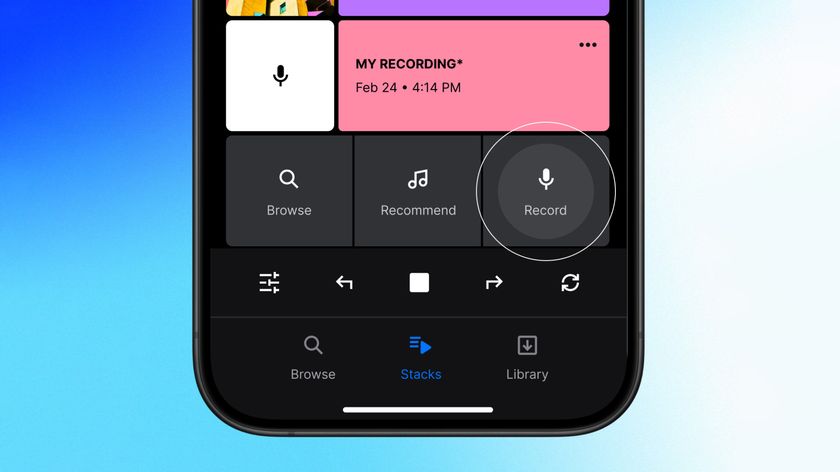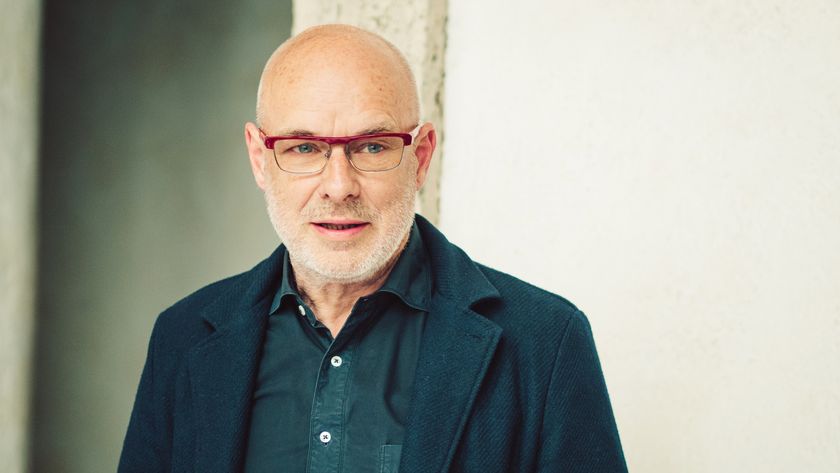Everything Everything talk latest album Get To Heaven
Jon and Alex discuss their subversive guitar music

Introduction
They studied jazz, write on laptops and don’t care about tone. Meet Jonathan Higgs and Alex Robertshaw, the guitar players who are making pop progressive…
Ridiculously-schooled musicians, raised on 90s rock, making adventurous synth-laden pop tunes. You might not expect those ingredients to make a great band, but Everything Everything are far from your average bunch of kids with guitars.
The Brit foursome have proven that Brit rock doesn’t have to be all arena-sized chords and obnoxious attitude
At a time when other bands of the era were pedalling Oasis knock-offs to the delight of the trendy music press, frontman Jonathan Higgs, guitarist Alex Robertshaw and their Everything Everything bandmates were taking a very different route.
Packing a sound that shifts everywhere from Future Of The Left post-rock to Talking Heads synth-pop via Johnny Marr melodies and epic Jonny Greenwood soundscapes, the Brit foursome have proven that Brit rock doesn’t have to be all arena-sized chords and obnoxious attitude.
Instead, on latest album Get To Heaven, they show that less can be more. And very different. Just take a list to the record’s title track and opener To The Blade to hear Alex jolting in and out of life, sparking from restrained patience to electrifying energy in the blink of an eye.
We met up with the duo during the band’s recent headline tour and we looked to get inside the heads of these two refreshingly progressive songwriters.
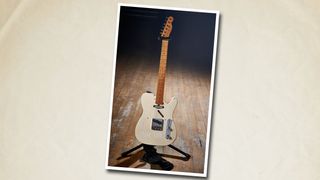
Gateway bands
When did guitar first come into your lives?
Alex: “It was through listening to bands in my early teens, the music my older brothers played. Rage Against The Machine, Nirvana, Blood Sugar Sex Magik by the Chili Peppers. Blur and Radiohead came a little later.”
We all had our shitty Zoom 505s trying to make OK Computer come to life in a village hall
Jon: “Smashing Pumpkins as well. Anything that was grunge or alt. You learned that you wanted to rock out with a guitar from America and then you learned that you wanted to use effects when you listened to Radiohead. We all went through that transition, we all had our shitty Zoom 505s trying to make OK Computer come to life in a village hall and it just didn’t work [laughs].”
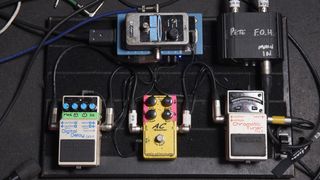
Space-saving playing
How much of a game changer was Radiohead for you, guitar-wise?
Jon: “I really hear Jonny Greenwood and his attitude in Alex’s playing. Radiohead aren’t establishment tech-y, they’re anarchic tech-y. They make stuff and break stuff, which I really like, and he does that with a guitar. It’s not about pristine tone, it’s all about making something you’ve never heard before.”
You have to think about the sonic space that is left over. That’s how it was for the first two records
Alex: “It’s about creating mood more than it is about sitting on top of a track.”
Your playing is incredibly sparse at times, it’s making a lot from very little
Alex: “I have a love of synth and so does Jon, and that’s how we would write a lot of the time. When you’ve played guitar all of your life and then you get a laptop it’s exciting to find out all of these things that you can do with sounds that you’re not familiar with.
“Once a song is filled up with all of these great sounds do you really want to play big chords and strum? No, it would be a mess. You have to think about the sonic space that is left over. That’s how it was for the first two records. On the new album we made a conscious effort to write from a guitar point of view.”
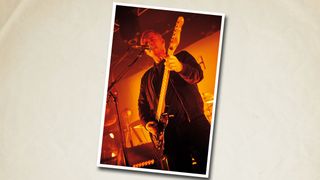
Anti-jangle jams
You’re certainly not your typical four-piece British guitar band...
Jon: “We grew up while the whole Oasis Britpop thing was happening and we got the tail-end of the Libertines when we were forming the band and it put us off that jangly, full sound. We wanted to be much meaner and leaner.
Back then it was, ‘We’re young, we hate this stuff, can we destroy it, please?’
“We were anti a lot of what was happening in the music industry at the time, especially in the UK. We really hated that landfill indie era. We thought it was all brainless. I respect it a bit more now but back then it was, ‘We’re young, we hate this stuff, can we destroy it, please?’
“We didn’t have laptops at that point in the band so all we had to express that feeling was our guitars. We tried to make things so angular and make the arrangements interesting. So much of music is so lazy, all the cliches of playing a guitar bore the absolute hell out of us.”
Alex: “I like guitarists that do sub-melody playing - Graham Coxon, Johnny Marr, the Strokes were good for that. It’s that kind of thing were there is something very enjoyable to listen to underneath the lead vocal.”
Jon: “I think if you make your songs good enough to not need a vocal then they’re going to be really good when you do put one on. Well, either that or they’ll be too full, which we’re also guilty of [laughs].”
Do you tend to start writing with a guitar or a laptop?
Alex: “It’s both. More often on the last album I would have a melody in my head and then I’d go to guitar. It’s the idea that you can have a thought on an instrument and put it straight into a machine and turn it into a fully-fledged thing, that’s what’s great about having a laptop at hand.
“Jon will sometimes have something, an insane laptop creation and we have to think about how we can make it work as a band. We all have to battle and work it out in a room.”
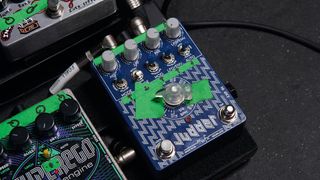
Judder time
Regret is an interesting guitar track on the new record; the guitar part really moves the song.
Jon: “Dude, that is a terrible guitar track! I wrote that tune, it was a simple thing I used to sing around the house because it’s so dumb. It was a case of playing it out really standardly on these off beats.
“We recorded it and it was quite retro and not like us, it wasn’t very forward-looking and we wanted to shake it up so we got this middle eight and we encouraged Alex to play all over it and ruin it. He did that using his [MWFX] Judder pedal, with this really horrible kind of snarling tone.
You can do totally unrealistic things with the Judder pedal and it makes you sound like Steve Vai on crack
“The song totally lurches to the left when you get to that point in it and that saves it from being a straight retro thing and that is a really good example of using a traditional structure and then throwing it aside. I’m quite proud of what we did with that.”
Alex: “That Judder is a bit of a signature for the new record, like on the end of Spring/ Sun/Winter/Dread, that repeating solo thing is just entirely that pedal. You can do totally unrealistic things with it and it makes you sound like Steve Vai on crack.
“There’s a tongue-in-cheek humour to it as well, which is something we’re into. It’s Zappa-like. It can make you sound like an outrageous guitarist or it can make you sound like the worst guitarist. I like being on that line.”
No Reptiles seems like one that has a real free-form feel to it…
Alex: “Live, that song is a growing, ambitious thing, but on record it’s all about trying to find a pocket in the distance for me to sit in. I felt like there was a lot of in-your-face synth stuff and there wasn’t a lot of distance so I wanted to play off the harmony in a less square way. It’s a very square-moving harmony.
“Live that song is like a massive guitar solo that is very quiet in the mix. That isn’t regimented at all live, I just have a starting and end point. That’s very liberating and a lot of fun.”
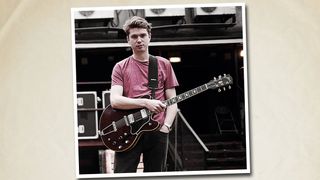
Reckless writing
Are you able to do that often? That reckless abandon feel seems pivotal to this band.
Jon: “In the past it was no because we had these complex songs and we stuck to our guns regimentally and we had to stick to the rules otherwise we would fuck everything up. On this record we set aside whole sections of songs where we told Alex to do what the fuck he wanted.
On this record we set aside whole sections of songs where we told Alex to do what the f**k he wanted
“I felt we had this resource that was very much underused. Mike’s [Spearman] not going to play a drum solo unless you absolutely force him to, Jez [Pritchard] will probably play a bass solo but nobody wants that. So we gave Alex these sections and told him to just mess about.
“I think that’s been really good for him, good for the sound and good for the whole atmosphere. It’s now less of a feel where it’s as if we’re on a click and we have to get to the end of the song otherwise we’re dead.”
Alex: “I remember we were at a festival and I saw the Bad Seeds play. They were playing and the song was getting faster and faster and louder and louder and you felt like at any moment it was all going to fall apart. Nick Cave was in the crowd and it was chaos.
“I’m getting more into that kind of thing, there is a great atmosphere in a room when someone is freely expressing themselves and it could go wrong, that is really exciting. I went to go see Kings Of Leon once and it was so boring, it was just like listening to the CD really loud. It’s nice to have space to experiment live, like on Spring/Sun… and the end of Get To Heaven where there’s an anti-solo moment.”
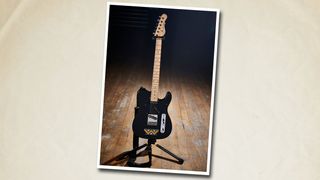
WWGCD?
That solo is a fantastic guitar moment, but not what you would call a fantastic piece of playing, perhaps!
Jon: “The end of Get To Heaven is just really bad guitar playing for a moment, which is funny knowing how really good Alex is. That’s his opportunity to shine and he does this really shit solo on purpose with a not very good tone and it was recorded in a hotel room. We tried it again through some amps but it sounded too good! If it was this great solo it would be horrible.”
I was just thinking, ‘What would Graham Coxon do? What would Dave Longstreth do?’
Alex: “There was one moment where Jeremy asked why that bit was in there and it sounded shit and that made me want to keep it in even more. It draws emotion out of people, it goes from this super slick production to feeling like the song is about to fall apart. I wanted that light and shade. I was just thinking, ‘What would Graham Coxon do? What would Dave Longstreth do?’ Having sections like that makes for a more vibrant album.”
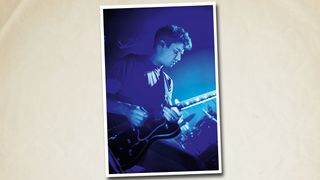
Better playing through listening
Does that sum up the feel of the band - it’s not perfect but it is emotion-packed?
Jon: “We are highly trained in music and know what we’re doing, but it’s so important to realise that isn’t the be all and end all and know when to throw all of that away. If the music is all one colour then you can’t see anything.”
It’s been five years since you released your debut album. How have you evolved as guitarists since then?
I’ve become a better listener playing with people all the time. I’ve learned to find a place for suitable guitar parts
Alex: “I don’t think I’ve strummed a chord since I joined the band.”
Jon: “We’ve saved that for album four!”
Alex: “I’ve become a better listener playing with people all the time. I’ve learned to find a place for suitable guitar parts. I’ve learned to not play. When you first join a band, everyone just all plays at the same time.”
Jon: “Everyone has always had space to do their own thing, but it used to be that everyone was doing their own thing all at the same time so no one knew what the fuck was going on!”
Everything Everything’s Get To Heaven is available now on Sony Records.

Rich is a teacher, one time Rhythm staff writer and experienced freelance journalist who has interviewed countless revered musicians, engineers, producers and stars for the our world-leading music making portfolio, including such titles as Rhythm, Total Guitar, Guitarist, Guitar World, and MusicRadar. His victims include such luminaries as Ice T, Mark Guilani and Jamie Oliver (the drumming one).

"Reggae is more freeform than the blues. But more important, reggae is for everyone": Bob Marley and the Wailers' Catch a Fire, track-by-track

“Part of a beautiful American tradition”: A music theory expert explains the country roots of Beyoncé’s Texas Hold ‘Em, and why it also owes a debt to the blues

"Reggae is more freeform than the blues. But more important, reggae is for everyone": Bob Marley and the Wailers' Catch a Fire, track-by-track

“Part of a beautiful American tradition”: A music theory expert explains the country roots of Beyoncé’s Texas Hold ‘Em, and why it also owes a debt to the blues


